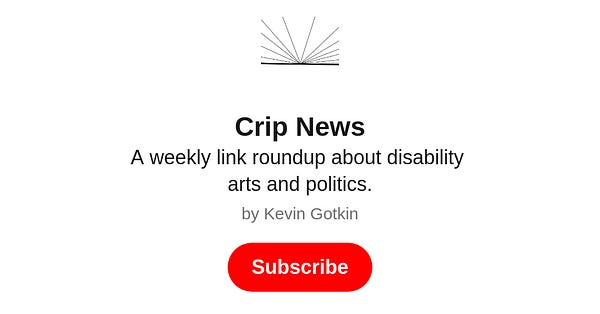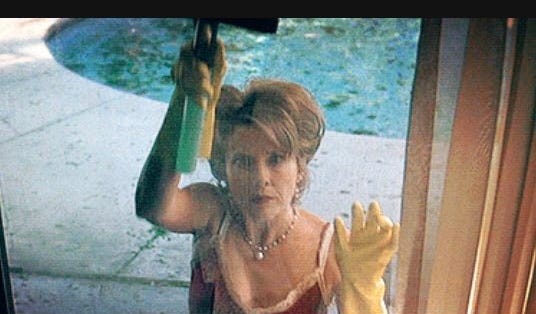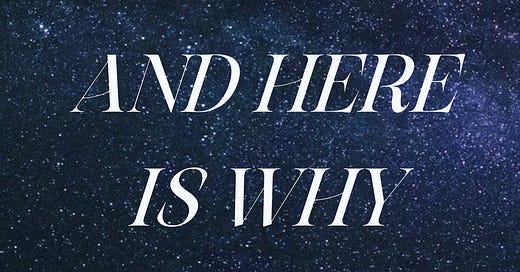Confessions of a Former Pandemic Shamer
On reframing and relearning to live amidst uncertainty
“I want to write about pandemic shaming but I don’t want to be canceled,” I texted a friend recently. “That’s your opening line,” she replied.
Now seems like a bad time to write about how I am a reformed pandemic shamer, which perhaps makes it the right time. The world, always unpredictable, feels even more so these days.
It is, perhaps, a most profound reflection on what it is to navigate empathy and care during a time when the stakes are so high and the structures meant to “care” for us are increasingly revealing that they are broken or nonexistent to begin with—that I am worried writing about my relationship with shame will incur shaming. Well if it must be a hall of mirrors, it would not be the first time in which I’ve functioned as a reflection.
If I followed me on Instagram I would mute myself so quickly.
I found myself thinking this often last year and into this one, my own shame winding its way into the back of my brain (perhaps this type a nudge, a good shame, a log off shame) after I would post my daily retinue of information. Mutual aid links, some articles or something about whatever the latest science was from people I trusted. Some great memes made by disabled friends about what it was like to be sick. And then some selfies, usually, where I’d write paragraphs, processing in real-time, what it was like to watch others – my friends, also watching this story in real time – make different decisions than me during Covid. “I’m not going to look at some of you the same way again,” one memorable one said.

Besides being insufferable (hopefully it was good entertainment for someone), in the first few months of the pandemic, I was an eternal Charlie from It’s Always Sunny with his wall of suspects and red string, assessing who was trustworthy and who had moved down the rankings. These were people I knew, my friends, now rendered into a false flatness, one that made me feel I could reasonably control the situation, at a time when we all so desperately sought, and failed to find, any semblance of control.
It was a constant, near obsessive monitoring. There was and is truth to the reality that learning people we love choose different things for themselves, things we may not choose for ourselves, can be devastating. But at a time when so many were talking about what new forms of care could look like, there didn’t seem room for a harm-reduction approach to people making decisions that felt aberrant to “What Was Currently Acceptable To Be Doing.” Rarely did we pause to make sure all our definitions were the same, to assemble a glossary of terms, to add in the necessary asterisks—who could be doing what was “acceptable” and “safe,” who decided what those terms meant?
Here is something I found, that I wrote last year (I got asked to write it for a magazine but they ended up not wanting it and asking if my thesis was blaming Fauci, alas, it pretty much was):
There are going to be so many more of us. So many of us are sick, I think, at the same time I see headlines about how to ring in a sexy summer. Celebrity culture is over, many decried, as news cycles moved from one “intimate” celebrity gathering to the next, photos of which were posted willingly by the subjects with the requisite “we all did the political theater of getting our temperature taken before we spat in each other’s mouths, please no hate in the comments!”
How quickly American amnesia has functioned for a moment which is ongoing. I felt like a scold, an overbearing “vibe killer” for asking people to please remember the pandemic existed. The news didn’t help, as it seemed to simply stop reporting on what was happening as more and more people died.
July 21 headlines: Dr. Anthony Fauci to throw first pitch for Washington Nationals’ Season Opener.
October 29 headline: Oregon health official dressed as clown while announcing coronavirus deaths.
Nov. 21: Andrew Cuomo To Receive International Emmy For 'Masterful' COVID-19 Briefings.
November 29: Biden-Harris transition releases statement from “co-first dog-elect Major Biden.”
It made some sense that the conversation would go like this. I remember as more people got sicker, as more of the people caring for them were forced to do so in terrible conditions, as the world tilted on its axis, people started clapping at 7 pm. (Some neighborhoods were louder than others; a chart could graph this, with volume of applause correlated to guilt around being able to afford staying inside, just a theory I am working on.) In generous moments I wanted to think the clapping was a way for some to say I’m here, I’m still here, which made far more sense than the idea that applause was a fitting tribute for “healthcare heroes.” But generosity felt hard to come by. Too often I watched my own instincts to blame someone, something, mostly directed at people who were not wearing masks as if they alone were responsible for the brokenness of America, as if a few layers of fabric would fix that.
To suggest that a hyper-emphasis on mask wearing (not that masks are bad, masks are good! wear the masks!) was a way to make individual people feel their own actions were the hinge on which all pandemic futures rested—this did not go over well.
Blame, like grief, feels ambient in these times. There is too much of it. Nowhere to place it squarely, nowhere to lay it to rest.
And so I felt myself toggling mightily between the weight of what was happening around us and the smaller, more textural sins, the ones I felt I could control or understand, or at least use as distraction from the larger and more unbearable truths. The things people posted, or didn’t post, became a treatise on their Novel Coronavirus Pandemic Rollout Plan, every acquaintance promoted to the role of public official. There was more internet infighting, more viral oddities, more “milkshake ducks,” the speed of these doubled or tripled, the whole internet on the case. The internet as Argus, the hundred-eyed giant, now magnified with the addition of many more eyes.
I found myself at a loss trying not to judge people who were out and about, partying, living life—at a time that was so terrifying, at a time that was killing people. I did not succeed in suppressing the rage—I yearned for the partiers to be publicly shamed. I didn’t want them to be sick, but there was a sort of knowing “figures” when they would test positive for Covid. I hated myself for thinking this, and I thought it anyway. Me, who has been sick my whole life, who has had a body that constantly failed me, a brain that careens often into darker corners I would rather not go—I couldn’t bridge the gap.
There was a time I wanted to think those people who got Covid maybe deserved it, the ones who had been traveling, who had been showcasing this, who had been able to post through it. I knew that wasn’t how anything worked, though. No one deserves to get sick, and more so, sickness doesn’t care. It can’t see what we post, it doesn’t take into account our moral positioning. A hermetic existence may have not been able to prevent you or a loved one from getting sick, while others routinely travelling may have been fine. It is unknowable, uncertain, and perhaps that’s part of why it scares us so much.


I asked other people about their experiences with shaming and the pandemic, and found a myriad of answers. Some people felt like me, where they now wished people would do their best but found themselves letting go of the anger and rage for what they couldn’t control, directing that upwards instead of interpersonally. Other people seemed to go in the other direction, becoming angrier or more isolated. One person said, “early pandemic me looked a lot like childhood evangelical me,” while another said “I’m angrier now than the beginning, ironically, the covid shaming era caused damage.”
“Immunocompromised and spent lots of time fuming about people not caring if they kill me. Letting that go a little has helped my insides rot less,” one response read. “Not judging as much as long as someone doesn’t knowingly expose me,” one said. “I had the opposite experience, I work in the ICU and started getting furious as the vaccine came out, beds were full,” another replied.
“Realized there is too much focus on the unvaccinated and not enough focus on the politicians not working to increase the resources in our healthcare system,” one said. “Moral superiority at the beginning was comforting, now I know assessing actual risk is hard,” someone else replied. “Still sad about pandemic-is-over-attitudes but not into shaming people - blame UK govt for creating chaos and encouraging individualistic desensitization.”
At the start of the pandemic I wrote about what it means to delve into the unknown, something I still feel now, especially with the rise of variants. But with uncertainty came anxiety, and that anxiety was often just loosed upon the world, usually via a scolding reminder or moralizing thinly veiled as “trying to help.”
With the continual lack of a superstructure in which to guide us through these uncertainties, we all become experts fumbling around in the dark, not just about what is best for us, but what is best for others, too. This mirrors itself in the policy around the pandemic, and how it’s not simply our instincts to blame others that has caused a fixation on the individual—but a deliberate side effect of the powers that be failing to take measures to establish systemic solutions.




That simmering ball of hot rage that fueled inside me, that always felt primed to crawl its way out, as bile or something similar, like a 30-tweet thread—I quenched it. It’s still there, molten hot. But it’s not searing away my insides, merely reminding me there is more unfinished.
Looking at where I can better channel that energy, that rage, is healing in and of itself. Seeking joy, connection, solace with others—this is my medicine, better than what most doctors have given me. It doesn’t fix things, of course not. But what does fix even mean? What if I thought about my pandemic response as I think about my chronic pain, a process of management rather than elusive/nonexistent cure?
I found myself talking so much about community, in the absolute despairs of isolation, and doing very little to actually tap into mine. In fact in many ways I allowed an undulating mass of internet strangers to feel like kin, which they were not, a huge part of why I stopped using social media. To refocus and reframe is not to forget this moment, it is not to gloss over the terrifying reality of our crumbling world. It is to sit beside it, hand in hand, and find ways to create, to restore joy, to reenergize, to help others, to be kind to yourself. It is to accept that everyone will get sick someday—whether from Covid or not. It is to be ready to love, to cherish, to nourish, without blame. Without shame.
Thanks everyone for reading, if you disagree that is totally fine, please don’t try to ruin my life if you do disagree though, that would be bad. Below are some reading suggestions, not all related also just things I think you should read.
Read this beautiful poem on shame and sickness linked below:
Facing omicron feels like when a patient has relapsed by Rachael Bedard
How the Largest Union Fight of 2021 Was Won By Jess Banks and Ahmed Akhtar
MY BEAUTIFUL DARK TWISTED ‘GUTFELD!’ EXPERIENCE by Sarah Hagi






Books:
With so much love and gratitude,
Shelby (and Clem)





“If I followed me on Instagram I would mute myself so quickly.
I found myself thinking this often last year and into this one, my own shame winding its way into the back of my brain (perhaps this type a nudge, a good shame, a log off shame) after I would post my daily retinue of information.”
I felt this so hard, wow. But also: you were doing your best in an absolutely surreal, terrible, traumatic time to be alive and have a body and your use of social media to cope and feel that you had some control over your world is valid. I think a lot of people shared your sentiments about how people were behaving during the pandemic and were glad to see their perspective mirrored in you. Don’t be too hard on yourself! It’s the trying and refining and releasing ourselves of past ways of seeing in favor of better ones. Thanks for this article !
I’m also chronically ill & this piece was exactly what I needed to read. I’ve evolved as well from past shaming…I just cannot hold space in my life for that while also living the peaceful experience I actually desire. So it was an easy choice ultimately but truthfully? I don’t regret a single moment of shaming from before😈